Activities and Outputs
Post on Brexit for the International Karl Polanyi Society, Vienna
In May 2020 I was one of a number of contributors invited to write a post on Brexit for the International Karl Polanyi Society in Vienna. My post was called 'The Conservative Party's Impossible Brexit Politics of 'Habitation versus Improvement''. It is available, along with the whole debate, on the website of the International Karl Polanyi Society.
Political Economy for the End Times Podcast: Brexit, Empire, and the 'Let Down'
I was interviewed by Jack Copley and Javi Moreno for their Political Economy for the End Times podcast series. My episode is called 'Brexit, Empire, and the 'Let Down'', and it appears on the podcast website. I was asked to reflect on the implications of Brexit for progressive political strategy in relation to European integration, and I was also asked to reflect on the way in which images of Empire have now routinely come to shape the prevailing political discourse concerning Brexit.
Widening Participation Talk at Sir John Talbot's Comprehensive School, Whitchurch, Shropshire
On June 25th 2019 I was invited back once again to my old school to talk to the Sixth Form Forum. The students had asked me to talk about Brexit back in October 2018, and they wanted a follow-up session this time around: not one that simply brought them up-to-date with things that they might in any case already have seen on the news, so much as to show them the types of questions that they might be asked about Brexit if they choose to study politics at university in due course. I delivered a new session called 'Imperial Nostalgia and Brexit' that I had worked up specifically for them. Once more I was able to speak to over fifty sixth-formers. I will be invited back in the autumn to unveil our Colonial Hangover project to them.
Political Studies Association Schools Day
On June 6th 2019 I delivered the keynote lecture at the Political Studies Association Schools Day at the University of Warwick. The theme of the event was the politics of the future. My talk was entitled 'Democracy and Intergenerational Justice', and it focused specifically on how young people understand the mandate that was delivered for the UK to withdraw from membership of the European Union in a decision over which they had no say. In particular, we debated the possibility of moving towards a voting system in one-off events such as referendums whereby votes would be weighted proportionately according to how long you could be expected to live with the consequences of the result.
Presentation at Université Sorbonne Nouvelle, Paris 3
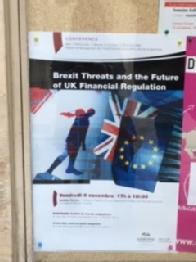

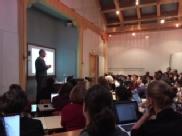
On 9th November 2018 I delivered a talk at the Institut du Monde Anglophone at the Université Sorbonne Nouvelle Paris 3. The talk was entitled, 'Brexit Threats and the Future of UK Financial Regulation'. The paper was designed to show in how many different directions the Conservative Party was pulling itself at that time over what to do about Brexit and how the City of London would fit into the post-Brexit global financial landscape. Global financial markets will inevitably be remade once Brexit frees the City from regulatory oversight from the European Commission, and the best bet at the time of delivering the presentation was that this would be in response to the City increasingly incorporating itself within the type of minimalist regulation usually associated with offshore financial centres. The paper was delivered one week before Theresa May presented her withdrawal agreement to a fractious Cabinet and an even more fractious Parliament, and at that time two potential models of the new regulatory future were still being discussed. One was the so-called Jersey Model, in which the UK would continue to follow EU rules for the trade in goods but not for the trade in services. The other was the so-called Singapore-on-Thames Model, in which a free-wheeling 'Global Britain' would seek to gain competitive advantage through regulatory undercutting. Both models seemed to me to point in the same direction when it comes to the question of how the City would in future be inserted into global financial markets. Both appeared to point to the British financial services industry being compensated for the loss of passporting rights within the EU financial space by being allowed pretty much to write its own regulatory system.
Widening Participation Talk at Sir John Talbot's Comprehensive School, Whitchurch, Shropshire
On October 2nd 2018 I was invited back to my old school following my visit in May. The students had asked me to come back to talk about Brexit, and I delivered a new session on 'Brexit and Democracy' that I had worked up specifically for them. I spoke to over fifty sixth-formers, and I will be going back again very soon.
Seminar on Race, Class and Nation in Modern Britain, Queen Mary University of London
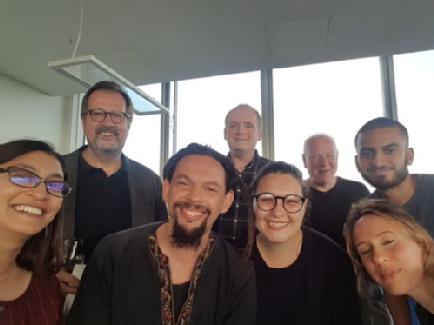
On June 19th 2018 I gave a short presentation entitled 'Buccaneering Britain' to a seminar held at Queen Mary University of London on Race, Class and Nation in Modern Britain. The event was organised as part of Robbie Shilliam's leaving celebrations. My paper looked at the politics of memory in relation to the image presented by the most gung-ho of Conservative Brexiteers of a 'buccaneering' Britain that will approach free trade deals with gusto in the post-Brexit world. This construction invokes the active recall of particular aspects of British history in the form of constant repetition of a limited number of stylised tropes. Pride of place in this regard goes to 'You must remember that Britain has always been a great trading nation' and 'You must remember that Britain has always been a great maritime nation'. Yet this simultaneously entails a commitment to passively forget other histories which would focus on how the British Empire was constructed through violence and how British control of the seas meant control of all the trade that was conducted by sea, including that in people. The contemporary politics of race, class and nation in Britain is trapped, I concluded, in a telling of history that has been hijacked by Brexiteer opinion. This makes a more restorative politics - a reparative politics even - seem further away than ever.
Keynote Lecture at Universität Witten/Herdecke
On June 9th 2018 I delivered a Keynote Lecture at the conference called 'Rethinking the EU' at Universität Witten/Herdecke. The title of my talk was 'Brexit and Economic Justice: From Britain's EU Referendum to Empire 2.0'.
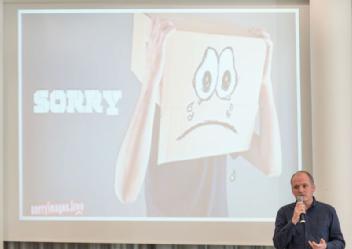
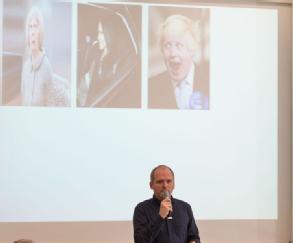

Abstract from the conference programme: "Matthew Watson will be speaking to the conference theme of 'Rethinking Justice within the European Union' from the perspective of his ongoing ESRC Professorial Fellowship project, 'Rethinking the Market'. He will be reflecting on the post-Brexit politics of European Single Market membership in the UK, but at the same time trying to explain how some of the more surprising pro-Brexit constituencies at the 2016 EU referendum were animated by perceptions of economic justice postponed. These were people who had done everything that had been asked of them over the previous thirty years to adjust themselves to supposed new market 'realities', but who had nonetheless seen their lives get harder and their life chances less secure. For them, the vote against continued EU membership was arguably nothing to do with the European Union at all, so much as with a more generalised revolt against being sold down the river in the interests of enhancing national economic competitiveness. The Hard Brexiteer position on leaving the European Single Market and the EU customs union should be particularly troubling for these Leave-voting constituencies. It is predicated on what Bauman has called a 'retrotopia', a yearning for the return to a golden age in which British political elites were much more secure in their conceit that their country punched above its weight as an undisputed world leader. The Hard Brexiteer dream of post-Brexit 'sunny uplands' imagines the reinvention of an Anglosphere of pure free trade relations between an entirely deregulated group of English-speaking countries. This has been variously described amongst the pro-Brexit factions of the Conservative Party as 'Global Britain', 'the Singapore Option' and 'Empire 2.0'. Whatever name is eventually chosen to describe what the Conservative Government believes it wants from Brexit, the prospects for those people who voted against continued UK membership of the EU on the grounds of having had their claims to economic justice ignored will presumably only get worse. They seem sure to be required to experience an even more extreme version of what they thought they had voted to leave behind. The question of economic justice for all within the European Single Market is one that EU elites should still be prepared to pay more attention to. But the trajectory that the Hard Brexiteer settlement looks likely to impose upon the UK is no solution at all.
Oxford University Press Blog Post on Brexit: Part 1
In August 2016 I was invited by Oxford University Press to do some filming for their website, answering questions on Brexit. This was to help them in their advertising for the seventh edition of Baylis, Smith and Owens's The Globalization of World Politics, to which I am a contributing author for the chapter on Global Trade and Global Finance. These are two dimensions of the modern-day phenomenon of economic globalisation that will definitely be impacted on by the UK's decision to withdraw from the European Union.
As a follow-up to my afternoon filming, I was then asked to write two blog posts for the OUP website. The first was published on September 25th 2016, and is called, 'Brexit and Article 50 Negotiations: What it would take to strike a deal'. This post, along with the accompanying film, can be found via the following link.
